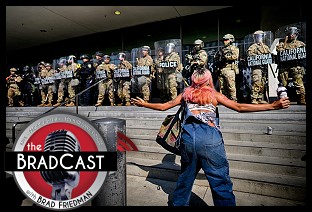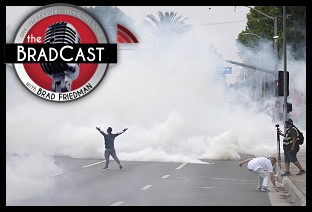 No matter everything else on today's BradCast, we end with some bona fide very good news today for voters in a key battleground state! [Audio link to full show follows below summary.]
No matter everything else on today's BradCast, we end with some bona fide very good news today for voters in a key battleground state! [Audio link to full show follows below summary.]
Speaking of key battleground states, it was state primary Election Day on Tuesday in New Hampshire and Rhode Island, the penultimate primaries of the season (with only Delaware left to go next Tuesday in Joe Biden's home state.) We cover noteworthy results today from both states, even if there were few surprises.
Next, folks up and down the West Coast have literally been "seeing red" over the past day or two, as wind-sparked, heat-fueled, climate change-intensified infernos continue to burn out of control through millions of acres at a record pace today. Among the results has been blood red sunlight across parts of Northern California and much of the Pacific Northwest, even in areas far from any active blazes.
During a press conference this afternoon, Oregon's Gov. Kate Brown described the outbreak of fires burning in both her state and neighboring Washington as "unprecedented", warning they could result in "the greatest loss of human life and property due to wildfire in our state's history." As we went to air, officials were prioritizing the safety of residents --- many of whom are evacuating, others who had to be airlifted out --- and homes, with hundreds already reportedly destroyed. These apocolyptic stories of millions of acress burned and communities completely wiped out should be front page news everywhere, but aren't. And every story should about them should tie the record-setting, catastrophic disasters to our quickly worsening climate crisis, but they don't. We do.
Then, we're joined by Slate's ace legal reporter, and one of our favorite guests, MARK JOSEPH STERN, for a two-fer today. First up, Stern explains the unprecedented use of the Federal Tort Claims Act, as invoked in a federal court filing on Tuesday night by the U.S. Dept. of Justice, to try and protect Donald Trump from a defamation lawsuit filed against him in New York state court. The case involves columnist E. Jean Carroll who alleges Trump raped her in a department store dressing room in the 1990's. After she described the incident in a recent book, Trump called Carroll a liar, claiming to have never even met her (despite a photograph of them together), and asserted he couldn't have raped her because she was "not my type."
Carroll sued the President for defamation and, after successfully defeating several motions to dismiss by Trump's personal lawyers, was set to both depose Trump in the case and obtain a DNA sample from him that she believes will match a stain on the dress she said she was wearing during the alleged assaulted at NY's Bergdorf Goodman department store in 1995.
On Tuesday, the DoJ intervened with a stunning motion to move the case from state to federal court, and replace Trump's personal defense attorneys with their own. If upheld by the court, that would effectively end the case under the Federal Tort Claims Act, where defamation suits against federal employees are barred. Stern, however, explains what the law is meant to do --- protect federal officials from being held personally liable for lawful acts done in the course of carrying out their jobs --- versus how the DoJ is now attempting to use it to shield Trump from liability for defaming a woman who says she has evidence of a rape more than two decades before he became President. Whether Bill Barr's DoJ attorneys will successfully prove to a federal court that defaming a citizen while responding to reporters questions about a rape twenty-five years ago is truly within the scope of a President's duties remains to be seen. But the filing itself is now likely to push the deposition and DNA test, in any case, beyond the November 3rd election, as Trump was hoping for.
Finally, we get to the bona fide good news today out of North Carolina, where a panel of state court judges late last week finally struck down an 1877 law meant to "secure white supremacy" in the state following the post-Civil War Reconstruction period. The law barred former felons who completed their prison sentences as well as all parole and probation from registering to vote if they still owed court-imposed fines and fees. As Stern reports --- and as revealed during the course of the case --- the law was originally spearheaded by a state lawmaker who presided over the lynching of three Black men and was meant, according to documents [PDF] unearthed by an expert witness historian for the plaintiffs, to prevent "the honest vote of a white man" from being "off-set by the vote of some negro."
The court's ruling means that some 100,000 NC residents are now newly eligible to vote in the 2020 Presidential election in one of the most closely divided states in the nation Another ruling from the same panel, likely to come after a trial, according to Stern, could result in another 70,000 currently disenfranchised former felons becoming eligible to vote as well. Moreover, as the case involves state law and is in state court, it cannot be overturned by the U.S. Supreme Court. Stern --- who recently published "An Extremely Comprehensive Guide to Making Sure Your Vote County, In Every State", also explains that the ruling will almost certainly not be overturned by the 6 to 1 liberal majority on NC's Supreme Court because, as he tells me, "there are a lot of bad ass women of color on North Carolina's state Supreme Court, and I think these individuals are going to say we cannot tolerate a racist law from 150 years ago."
Not coincidentally, as a racist, 150-year old Jim Crow measure is finally being knocked down in NC, the GOP majority in Florida's state legislature just adopted a nearly identical measure just last year to bar former felons from voting if they have not paid off all court-imposed fines and fees. That law was found to amount to an unconstitutional poll tax by a federal judge earlier this year, but his ruling has now been stayed by SCOTUS until after the 2020 Presidential election in that key swingstate. The stay allowing Florida's "pay-to-vote" law is likely to block as many as 1.5 million potential new voters --- including a quarter of the state's male African-American population --- from voting this November in the Sunshine State...
(Snail mail support to "Brad Friedman, 7095 Hollywood Blvd., #594 Los Angeles, CA 90028" always welcome too!)
|


 Sunday 'Total Obliteration' Toons
Sunday 'Total Obliteration' Toons Thank You For Your Attention to This Matter:
Thank You For Your Attention to This Matter: 'Green News Report' 6/26/25
'Green News Report' 6/26/25
 Mamdani Primary 'Win' Augurs New Generation of Progressives Rising: 'BradCast' 6/25/25
Mamdani Primary 'Win' Augurs New Generation of Progressives Rising: 'BradCast' 6/25/25 U.S. Authoritarianism Under-way (But We're Still Here to Fight It): 'BradCast' 6/24/25
U.S. Authoritarianism Under-way (But We're Still Here to Fight It): 'BradCast' 6/24/25 'Green News Report' 6/24/25
'Green News Report' 6/24/25 'Anti-War' Trump Attacks a Mid-East Nation on False Claims About WMD: 'BradCast' 6/23/25
'Anti-War' Trump Attacks a Mid-East Nation on False Claims About WMD: 'BradCast' 6/23/25  Sunday 'Peacemaker' Toons
Sunday 'Peacemaker' Toons Senate Health Care Cuts 'More Extreme' Than House Version: 'BradCast' 6/19/25
Senate Health Care Cuts 'More Extreme' Than House Version: 'BradCast' 6/19/25 'Green News Report' 6/19/25
'Green News Report' 6/19/25 What 'Anti-War President'? MAGA Civil War Over Trump, Iran: 'BradCast' 6/18/25
What 'Anti-War President'? MAGA Civil War Over Trump, Iran: 'BradCast' 6/18/25 Trump Calls for 'Remigration', a Codeword for 'Ethnic Cleansing': 'BradCast' 6/17/25
Trump Calls for 'Remigration', a Codeword for 'Ethnic Cleansing': 'BradCast' 6/17/25 'Green News Report' 6/17/25
'Green News Report' 6/17/25 Last Weekend Today: 'BradCast' 6/16/25
Last Weekend Today: 'BradCast' 6/16/25 Sunday 'Despot Times, Despot Measures' Toons
Sunday 'Despot Times, Despot Measures' Toons Then They Came for the U.S. Senators: 'BradCast' 6/12/25
Then They Came for the U.S. Senators: 'BradCast' 6/12/25 'Green News Report' 6/12/25
'Green News Report' 6/12/25 Lawless Trump Warms Up for Insurrection Act: 'BradCast' 6/11/25
Lawless Trump Warms Up for Insurrection Act: 'BradCast' 6/11/25 Trump Inciting Violence, State of Fear in L.A., Elsewhere: 'BradCast' 6/10/25
Trump Inciting Violence, State of Fear in L.A., Elsewhere: 'BradCast' 6/10/25 Nevermind Elon and Epstein Files, Trump Declares L.A. 'Riots'!: 'BradCast' 6/9/25
Nevermind Elon and Epstein Files, Trump Declares L.A. 'Riots'!: 'BradCast' 6/9/25 'Jesus Weeps' at Trump's
'Jesus Weeps' at Trump's 300k 'Preventable' Deaths Since Trump USAID Shutdown: 'BradCast' 6/4/25
300k 'Preventable' Deaths Since Trump USAID Shutdown: 'BradCast' 6/4/25 Storm Warnings: 'BradCast' 6/3/25
Storm Warnings: 'BradCast' 6/3/25 SCOTUS Ignores Own Precedents In Recent 'Emergency' Rulings: 'BradCast' 6/2/25
SCOTUS Ignores Own Precedents In Recent 'Emergency' Rulings: 'BradCast' 6/2/25 'A World of Tyrants, Bribes, and Influence': 'BradCast' 5/22/25
'A World of Tyrants, Bribes, and Influence': 'BradCast' 5/22/25
 VA GOP VOTER REG FRAUDSTER OFF HOOK
VA GOP VOTER REG FRAUDSTER OFF HOOK Criminal GOP Voter Registration Fraud Probe Expanding in VA
Criminal GOP Voter Registration Fraud Probe Expanding in VA DOJ PROBE SOUGHT AFTER VA ARREST
DOJ PROBE SOUGHT AFTER VA ARREST Arrest in VA: GOP Voter Reg Scandal Widens
Arrest in VA: GOP Voter Reg Scandal Widens ALL TOGETHER: ROVE, SPROUL, KOCHS, RNC
ALL TOGETHER: ROVE, SPROUL, KOCHS, RNC LATimes: RNC's 'Fired' Sproul Working for Repubs in 'as Many as 30 States'
LATimes: RNC's 'Fired' Sproul Working for Repubs in 'as Many as 30 States' 'Fired' Sproul Group 'Cloned', Still Working for Republicans in At Least 10 States
'Fired' Sproul Group 'Cloned', Still Working for Republicans in At Least 10 States FINALLY: FOX ON GOP REG FRAUD SCANDAL
FINALLY: FOX ON GOP REG FRAUD SCANDAL COLORADO FOLLOWS FLORIDA WITH GOP CRIMINAL INVESTIGATION
COLORADO FOLLOWS FLORIDA WITH GOP CRIMINAL INVESTIGATION CRIMINAL PROBE LAUNCHED INTO GOP VOTER REGISTRATION FRAUD SCANDAL IN FL
CRIMINAL PROBE LAUNCHED INTO GOP VOTER REGISTRATION FRAUD SCANDAL IN FL Brad Breaks PA Photo ID & GOP Registration Fraud Scandal News on Hartmann TV
Brad Breaks PA Photo ID & GOP Registration Fraud Scandal News on Hartmann TV  CAUGHT ON TAPE: COORDINATED NATIONWIDE GOP VOTER REG SCAM
CAUGHT ON TAPE: COORDINATED NATIONWIDE GOP VOTER REG SCAM CRIMINAL ELECTION FRAUD COMPLAINT FILED AGAINST GOP 'FRAUD' FIRM
CRIMINAL ELECTION FRAUD COMPLAINT FILED AGAINST GOP 'FRAUD' FIRM RICK SCOTT GETS ROLLED IN GOP REGISTRATION FRAUD SCANDAL
RICK SCOTT GETS ROLLED IN GOP REGISTRATION FRAUD SCANDAL VIDEO: Brad Breaks GOP Reg Fraud Scandal on Hartmann TV
VIDEO: Brad Breaks GOP Reg Fraud Scandal on Hartmann TV RNC FIRES NATIONAL VOTER REGISTRATION FIRM FOR FRAUD
RNC FIRES NATIONAL VOTER REGISTRATION FIRM FOR FRAUD EXCLUSIVE: Intvw w/ FL Official Who First Discovered GOP Reg Fraud
EXCLUSIVE: Intvw w/ FL Official Who First Discovered GOP Reg Fraud GOP REGISTRATION FRAUD FOUND IN FL
GOP REGISTRATION FRAUD FOUND IN FL

































